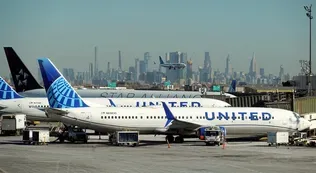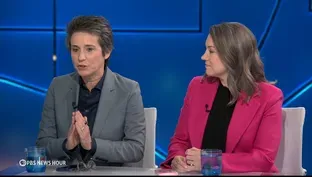
The implications of Israel's plan to expand Gaza operations
Clip: 5/5/2025 | 9m 52sVideo has Closed Captions
The implications of Israel's plan to expand military operations in Gaza
The Israeli government voted to expand military operations in Gaza and could end with the reoccupation of the strip. Humanitarian officials warn that an Israeli plan to take over aid distribution in Gaza is unworkable, and more Palestinians will suffer. Nick Schifrin discussed the implications with David Makovsky of the Washington Institute for Near East Policy's Project on Israel-Arab Relations.
Problems with Closed Captions? Closed Captioning Feedback
Problems with Closed Captions? Closed Captioning Feedback
Major corporate funding for the PBS News Hour is provided by BDO, BNSF, Consumer Cellular, American Cruise Lines, and Raymond James. Funding for the PBS NewsHour Weekend is provided by...

The implications of Israel's plan to expand Gaza operations
Clip: 5/5/2025 | 9m 52sVideo has Closed Captions
The Israeli government voted to expand military operations in Gaza and could end with the reoccupation of the strip. Humanitarian officials warn that an Israeli plan to take over aid distribution in Gaza is unworkable, and more Palestinians will suffer. Nick Schifrin discussed the implications with David Makovsky of the Washington Institute for Near East Policy's Project on Israel-Arab Relations.
Problems with Closed Captions? Closed Captioning Feedback
How to Watch PBS News Hour
PBS News Hour is available to stream on pbs.org and the free PBS App, available on iPhone, Apple TV, Android TV, Android smartphones, Amazon Fire TV, Amazon Fire Tablet, Roku, Samsung Smart TV, and Vizio.
Providing Support for PBS.org
Learn Moreabout PBS online sponsorshipGEOFF BENNETT: The Israeli government voted today to expand its military operations in Gaza, a plan that could end with the reoccupation of the Strip nearly 20 years after Israel ended its occupation there.
Meantime, humanitarian officials warn an Israeli plan to take over aid distribution in Gaza is unworkable and more Palestinians will suffer.
Israel has blocked all aid from entering for over two months now.
Here's Nick Schifrin.
NICK SCHIFRIN: In the shadow of Gaza today, Israel has its eyes on a bigger prize.
Tens of thousands of reservists are mobilizing to execute a new plan that calls for Israeli troops to clear large parts of Gaza and hold captured territory, says spokesman David Mencer.
DAVID MENCER, Spokesperson, Israeli Prime Minister's Office: The expanding and the holding of territories, not occupation, the expanding and holding of territories and remaining in them to prevent Hamas from taking it back.
NICK SCHIFRIN: The plan was unanimously approved overnight by the Israeli Cabinet, including far right Finance Minister Bezalel Smotrich.
BEZALEL SMOTRICH, Israeli Finance Minister (through translator): We are finally going to conquer the Gaza Strip.
We are no longer afraid of the word occupation.
NICK SCHIFRIN: Today, Israel is believed to control about one-third of Gaza, with an expanded buffer zone along the Gaza border and two corridors that bisect Gaza.
The new plan calls for Israeli troops to move the population of Northern Gaza to the south to what Army spokesman General Effie Defrin today called a -- quote -- "sterile area."
BRIG.
GEN. EFFIE DEFRIN, Israeli Defense Forces Spokesperson (through translator): The operation will include a broad offensive that includes moving a majority of the population of the Gaza Strip.
This is in order to protect it in a sterile area from Hamas.
We will repeat the model carried out in Rafah in other areas of the Gaza Strip.
NICK SCHIFRIN: After Israel's operation last year, this is what Rafah looked like.
Israeli officials say the new operation would take about two weeks to prepare, giving enough time for President Trump to travel to the Middle East and for presidential envoy Steve Witkoff to try and make a diplomatic deal to convince Hamas to release the living hostages among the nearly 60 it still holds.
The new plan also calls for Israel to take over the distribution of humanitarian aid after blocking all aid from entering Gaza for the last two months.
That block has led to desperate scenes like these and to the frailty of 12-year-old Rahaf Ayyad.
Today, she is hungry, a fragile shadow of what she used to be.
RAHAF AYYAD, 12 Years Old (through translator): I was bright and fun, and now I'm not anymore, just like you see.
I wish I could eat meats.
I only eat bread and za'atar and rice only.
Her mother, Shorouq, doesn't know what to do, and says the food her daughter needs is either unavailable or unaffordable.
SHOROUQ AYYAD, Mother of Rahaf Ayyad (through translator): Our children are dying in front of us, and we cannot do anything to help.
Right now, Rahaf only eats rice because the legumes hurt her stomach.
I can only afford rice.
That's all.
Everything here is so expensive.
They told me to get her fruits, vegetables, honey.
God knows, I'm trying my best.
NICK SCHIFRIN: Israel argues it needs to take over aid distribution because Hamas steals it to buy weapons.
And Israel says there is food in the markets.
DAVID MENCER: Israel's assessment is that, for months to come, there is enough food for everyone right now.
TOM FLETCHER, United Nations Under-Secretary-General for Humanitarian Affairs and Emergency Relief Coordinator: That runs contrary to international law, and the reality is that we're seeing every day kids are starving as a result.
NICK SCHIFRIN: Tom Fletcher is the U.N.'s top humanitarian official, who last visited Gaza earlier this year during a cease-fire, when 600 to 700 trucks of aid entered every day.
TOM FLETCHER: We were saving so many of the survivors of the military onslaught there.
And now we have gone two months.
Blocking aid kills.
It strips people of dignity.
It removes their medical support.
It removes the food from their mouths.
And two months is a long, long time.
NICK SCHIFRIN: Israeli officials I talked to argue that Hamas has been using the aid, even since the cease-fire, to perpetuate their rule and they convert the aid into military capacity in order to maintain their control over Gaza.
What's your response to that?
TOM FLETCHER: The aid I saw being delivered was medicines going straight into hospitals.
It was food going straight to families who needed it, to communities who needed it so badly.
We were opening up wells, so people at least had access to a water source.
I didn't see Hamas getting anywhere near any of that.
It's a brutal way to collectively punish a whole population for the crimes of Hamas.
NICK SCHIFRIN: To understand the implications of the new Israeli plan and how it's being received in Israel, I'm joined by David Makovsky, the director of the Washington Institute for Near East Policy's Project on Arab-Israel Relations.
David Makovsky, thanks very much.
Welcome to the "News Hour."
You heard the spokesman of the Israeli government in that story saying this is not occupation, this is clearing and holding.
But we also heard from the right-wing finance minister, Smotrich, saying, this is reoccupation.
So, as far as you can tell, what is it that the Israeli government hopes to achieve?
DAVID MAKOVSKY, Washington Institute for Near East Policy: I think they haven't decided yet how long they're going to stay.
Their goal is to disarm Hamas.
They have been at this impasse for a while now.
I was just over there.
I literally talked to dozens of people, and this was the centerpiece, that this was something they were going to do.
And it's clear what the objective is.
The question is also, what are the costs and does it fit into a wider post-conflict strategy?
And that's where it's less certain.
NICK SCHIFRIN: Could this be pressure?
Could this be a feint to try and get Hamas to make some kind of deal just in the next week or two that would be much closer to Israel's desire for them to release all the hostages up front, than actually go in with tens of thousands of additional troops and possibly reoccupy?
DAVID MAKOVSKY: I asked that question when I was over there, and they said, all we want is Witkoff, call it.
Witkoff was this idea of... NICK SCHIFRIN: Steve Witkoff, the president's special envoy.
DAVID MAKOVSKY: Steve Witkoff, the president's special envoy, to get half of the remaining hostages who are alive -- officially, the number is 24 -- and to see if you get half of them out now.
But when you press and say OK, what about the remaining half and are you going to do this anyway, and they say well we're going to disarm Hamas anyway.
So I said, well, is it the equivalent of telling someone, I'm not going to kill you at 6:00, I'm going to kill you at 7:00, but I need your help at 6:00?
And then what's Hamas' incentive if you're going to kill them at 7:00 anyway?
So there's some tension between these objectives.
NICK SCHIFRIN: And the bottom line there, it reveals that Israeli officials today believe they can win this war on the battlefield.
DAVID MAKOVSKY: Yes.
I mean, the issue is always not just the first tactical successes, and they might be impressive, but it's to ensure that there's not an insurgency that emerges after you win on the battlefield.
So you always want to see how can you translate your battlefield success to something, an enduring achievement?
And that requires a day after strategy as well.
NICK SCHIFRIN: So let's talk about that.
I talked to one of the protest leaders today who didn't want to go on camera, but said this to me today -- quote -- "There is no clear objective or coherent plan for the day after, and that is why some Israelis are questioning this today."
Do you agree?
Is there a day-after plan?
DAVID MAKOVSKY: No, because there's division within the Cabinet.
It's clear that the hard-right faction of Mr. Smotrich that you mentioned, and Mr. Ben-Gvir, they clearly want Israel to go there to stay, to have settlements and all that.
The military establishment is horrified by this idea.
Their job is to focus on disarming Hamas.
I would think President Trump could reconcile a lot of this by saying, Hamas, if you leave with your weapons, go into exile, and they're disarmed, we will make sure Israel leaves Gaza the next day and bring back the Palestinian Authority.
We know all the vulnerabilities of the Palestinian Authority that's based in the West Bank, but at least there would be a sense that Palestinians would be taking over Gaza, and I think that would be something that the Israeli people themselves, maybe including the gentlemen that you mentioned, could also get behind.
They all wanted to disarm Hamas, but they also want to get the hostages out, and they don't want to stay in Gaza.
They left in 2005, and they would, I think, turn it over to someone as long as they can feel that they're going to feel safe.
And right now the government has not tried to answer that question.
NICK SCHIFRIN: We have also seen reservists not showing up in numbers much higher than in the past.
Do we know how Israeli society, do we know how the reservists, the tens of thousands of reservists who are being called up, will respond to this?
DAVID MAKOVSKY: I think the head of the IDF Manpower appeared this morning at the Knesset, one of the panel's committees... and already said that 25 percent of the people were not showing up.
NICK SCHIFRIN: And that's a huge number.
DAVID MAKOVSKY: That's a huge number.
That number is likely to grow, if only for fatigue.
I mean, some of these people are doing 200, 300, 400 days of reserve duty since October the 7th.
And then you're going to have people questioning the wisdom of the whole approach, saying, you're dooming the hostages if there's going to be renewed fighting.
So you're going to have the fatigue factor and then something we have not seen until now, which is an ideological objection, because, when it came after October 7, reserve duty call-up rates, it was 130 percent of the people showed up, more than they needed.
And now I think we're going to look at these rates and see something different.
NICK SCHIFRIN: David Makovsky, thank you very much.
DAVID MAKOVSKY: Glad to be with you.
Jury selection begins for Diddy’s sex trafficking trial
Video has Closed Captions
Clip: 5/5/2025 | 4m 45s | What happened in the courtroom as jury selection begins for Diddy’s sex trafficking trial (4m 45s)
New book 'Personhood' examines reproductive rights battle
Video has Closed Captions
Clip: 5/5/2025 | 8m 28s | New book 'Personhood' examines escalating battle over reproductive rights (8m 28s)
News Wrap: Hundreds of flights canceled or delayed at Newark
Video has Closed Captions
Clip: 5/5/2025 | 5m 46s | News Wrap: Hundreds of flights canceled or delayed at Newark airport (5m 46s)
Sierra Hull on her journey to becoming a mandolin virtuoso
Video has Closed Captions
Clip: 5/5/2025 | 6m 35s | Sierra Hull reflects on her journey to becoming a mandolin virtuoso (6m 35s)
Tamara Keith and Amy Walter on voters and the economy
Video has Closed Captions
Clip: 5/5/2025 | 7m 26s | Tamara Keith and Amy Walter on who voters believe is responsible for the current economy (7m 26s)
What the Constitution says about due process for noncitizens
Video has Closed Captions
Clip: 5/5/2025 | 9m 13s | What the Constitution says about noncitizens' rights as Trump doubts need for due process (9m 13s)
Providing Support for PBS.org
Learn Moreabout PBS online sponsorshipSupport for PBS provided by:
Major corporate funding for the PBS News Hour is provided by BDO, BNSF, Consumer Cellular, American Cruise Lines, and Raymond James. Funding for the PBS NewsHour Weekend is provided by...

















